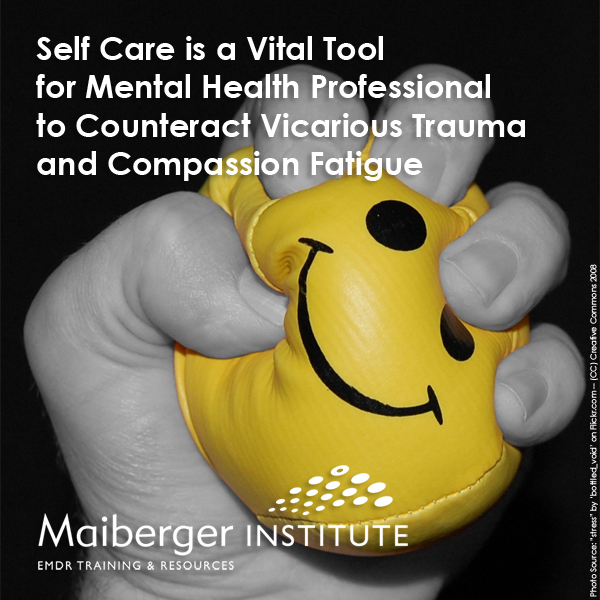
Written by guest blogger, Katie Asmus, MA, LPC, a certified EMDR clinician. She will be co-teaching the upcoming training “Self Care for Therapists” with Barb Maiberger, MA, LPC
As empathetic beings, simply through being in relationship with others who’ve had hard experiences, it is common to experience increased anxiety, depression, hopelessness, or general shifts in our beliefs about the world. A few weeks ago, I was invited to share a workshop on “Vicarious Trauma & Self Care” with a group of mental health professionals. Ironically, the date of the presentation fell on the week following Boulder’s flood. For those that were able to attend, there was a normalization and understanding about the conscious and unconscious ways that being in “the field’ of trauma effects us.
Many of us in the mental health world know, when we perceive a threat in our environment (physical, emotional, spiritual), our human brains and bodies mobilize a whole neurophysiological response to support us in fighting, fleeing, or ultimately freezing to most safely and effectively survive or navigate the situation.
The challenge is, if we do not ever get the chance to fight or flee, or discharge this aroused state from the nervous system, our body-mind systems remain activated, creating an internal self-perpetuating feedback loop informing us that we are still in danger. This same response of activation in the nervous system can get triggered when we witness or hear stories of trauma, or simply sit in the room with someone who has traumatic experiences.
Yes – it is true! Simply sitting in the room with another, our nervous systems are unconsciously and constantly entraining each other’s. This is why when we leave being with someone who is anxious, we may feel anxious ourselves, or relief in the ending of time together. On the flip side, when we are with someone who is calm and present we are also impacted.
Experiencing the trauma of others, just as with experiencing our own challenges directly, our brains, bodies, beliefs, and behaviors are impacted. Self-awareness and self care are crucial tools for both building inner resiliency and mitigating the effects of being in the “field of trauma” so that we may continue being of service for years to come.
One of the reasons why Barb Maiberger and I created “Self Care for Therapists” was to help therapist develop some of the crucial tools to counteract the challenges around compassion fatigue, vicarious trauma, and burnout.
Here are some tips and tools to navigate and mitigate the impacts of being with others who have experienced trauma:
- Understand the basics of the neurophysiology and somatic experiences of trauma and vicarious trauma: this normalizes and takes the shame out of this wise and natural survival process.
- Actively practice self-awareness and self-compassion: Know your own early warning signs of fatigue, or burnout.
- Build inner resiliency: Spend time every day doing things that are nourishing.
- Identify personal areas of challenge or vulnerability to stress: Know your own limits!
- Have a clear plan for self care and follow through with it!
- Know when to seek support!
Since today (October 10) is also World Mental Health Day, think about one thing you will do TODAY to nourish yourself! Enjoy!
CONTINUING EDUCATION TRAINING
Self Care for Therapists
Boulder, CO
November 16 – 17, 2013
EMDRIA Credits: 12 CEU
NBCC Credits: 12 CE hours (1.2 CEU)
Early Bird Special: Sign up before October 18, 2013 to receive a $50 discount on your registration fee.
Image Source: Roy Blumenthal





